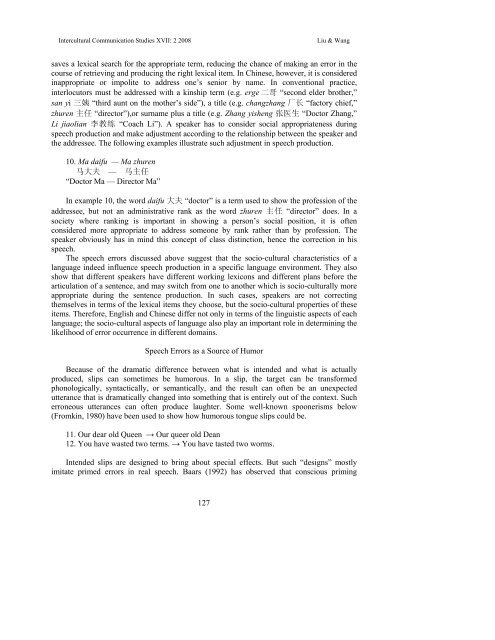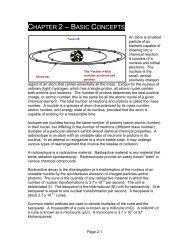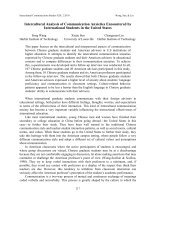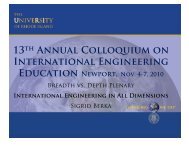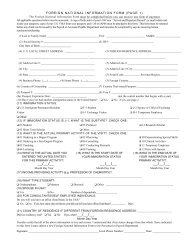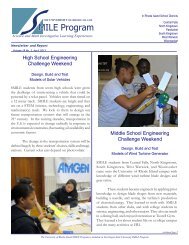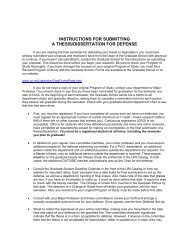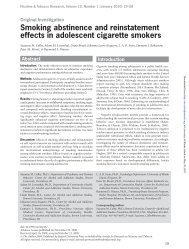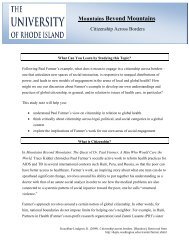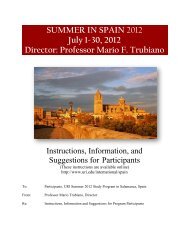Socio-cultural Impacts on Communication Slips
Socio-cultural Impacts on Communication Slips
Socio-cultural Impacts on Communication Slips
Create successful ePaper yourself
Turn your PDF publications into a flip-book with our unique Google optimized e-Paper software.
Inter<str<strong>on</strong>g>cultural</str<strong>on</strong>g> Communicati<strong>on</strong> Studies XVII: 2 2008 Liu & Wang<br />
saves a lexical search for the appropriate term, reducing the chance of making an error in the<br />
course of retrieving and producing the right lexical item. In Chinese, however, it is c<strong>on</strong>sidered<br />
inappropriate or impolite to address <strong>on</strong>e’s senior by name. In c<strong>on</strong>venti<strong>on</strong>al practice,<br />
interlocutors must be addressed with a kinship term (e.g. erge 二哥 “sec<strong>on</strong>d elder brother,”<br />
san yi 三姨 “third aunt <strong>on</strong> the mother’s side”), a title (e.g. changzhang 厂长 “factory chief,”<br />
zhuren 主任 “director”),or surname plus a title (e.g. Zhang yisheng 张医生 “Doctor Zhang,”<br />
Li jiaolian 李教练 “Coach Li”). A speaker has to c<strong>on</strong>sider social appropriateness during<br />
speech producti<strong>on</strong> and make adjustment according to the relati<strong>on</strong>ship between the speaker and<br />
the addressee. The following examples illustrate such adjustment in speech producti<strong>on</strong>.<br />
10. Ma daifu — Ma zhuren<br />
马大夫 — 马主任<br />
“Doctor Ma — Director Ma”<br />
In example 10, the word daifu 大夫 “doctor” is a term used to show the professi<strong>on</strong> of the<br />
addressee, but not an administrative rank as the word zhuren 主任 “director” does. In a<br />
society where ranking is important in showing a pers<strong>on</strong>’s social positi<strong>on</strong>, it is often<br />
c<strong>on</strong>sidered more appropriate to address some<strong>on</strong>e by rank rather than by professi<strong>on</strong>. The<br />
speaker obviously has in mind this c<strong>on</strong>cept of class distincti<strong>on</strong>, hence the correcti<strong>on</strong> in his<br />
speech.<br />
The speech errors discussed above suggest that the socio-<str<strong>on</strong>g>cultural</str<strong>on</strong>g> characteristics of a<br />
language indeed influence speech producti<strong>on</strong> in a specific language envir<strong>on</strong>ment. They also<br />
show that different speakers have different working lexic<strong>on</strong>s and different plans before the<br />
articulati<strong>on</strong> of a sentence, and may switch from <strong>on</strong>e to another which is socio-<str<strong>on</strong>g>cultural</str<strong>on</strong>g>ly more<br />
appropriate during the sentence producti<strong>on</strong>. In such cases, speakers are not correcting<br />
themselves in terms of the lexical items they choose, but the socio-<str<strong>on</strong>g>cultural</str<strong>on</strong>g> properties of these<br />
items. Therefore, English and Chinese differ not <strong>on</strong>ly in terms of the linguistic aspects of each<br />
language; the socio-<str<strong>on</strong>g>cultural</str<strong>on</strong>g> aspects of language also play an important role in determining the<br />
likelihood of error occurrence in different domains.<br />
Speech Errors as a Source of Humor<br />
Because of the dramatic difference between what is intended and what is actually<br />
produced, slips can sometimes be humorous. In a slip, the target can be transformed<br />
ph<strong>on</strong>ologically, syntactically, or semantically, and the result can often be an unexpected<br />
utterance that is dramatically changed into something that is entirely out of the c<strong>on</strong>text. Such<br />
err<strong>on</strong>eous utterances can often produce laughter. Some well-known spo<strong>on</strong>erisms below<br />
(Fromkin, 1980) have been used to show how humorous t<strong>on</strong>gue slips could be.<br />
11. Our dear old Queen → Our queer old Dean<br />
12. You have wasted two terms. → You have tasted two worms.<br />
Intended slips are designed to bring about special effects. But such “designs” mostly<br />
imitate primed errors in real speech. Baars (1992) has observed that c<strong>on</strong>scious priming<br />
127


